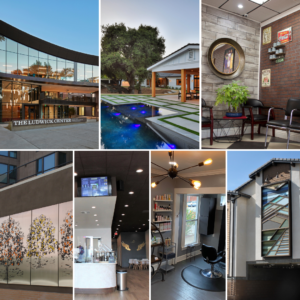 At the La Verne City Council meeting on Monday March 1, the City’s Community Development Department awarded seven local projects and businesses with its Community Design Awards. The projects were awarded in the categories of Historic Preservation & Adaptive Reuse, Institutional, Public Art, Residential and Interior Design.
At the La Verne City Council meeting on Monday March 1, the City’s Community Development Department awarded seven local projects and businesses with its Community Design Awards. The projects were awarded in the categories of Historic Preservation & Adaptive Reuse, Institutional, Public Art, Residential and Interior Design.
After soliciting nominations from the City Council, Planning Commission and City staff, seven worthy projects completed within the previous two years (2019-2020) were ultimately selected to receive an award. In order to qualify, the project had to meet the conceptual criteria within its nominated category. Criteria for each category ranged from functionality to use of materials to creativity, as well as design and architectural compatibility with its neighborhood and cultural relevance.
In the City’s General Plan, which prescribes policies for future land use and development, La Verne specifies a Community Design Element with the purpose of protecting the City’s small-town charm, promoting sustainability and improving architectural quality.
“We understand the considerable labor and effort that go into planning these extensive design and development projects,” said La Verne Mayor Tim Hepburn. “We are pleased that, despite the COVID-19 pandemic, we were able to continue this biennial tradition of recognizing our community’s excellence in design.”
The following projects were awarded 2021 La Verne Community Design Awards (LVCDA) with its corresponding categories:

- Historic Preservation & Adaptive Reuse, Institutional, and Public Art – The Ludwick Center at the University of La Verne – This Center was the second major project that the University of La Verne completed after its master plan was approved in 2017. It involved the repurposing of the well-known existing Brandt Hall residence and also included public art features, such as an intricately patterned bronze metal screen on its stairway.
- Residential – The Pieroth House – Owned by longtime La Verne residents Paul and Jessica Pieroth, the Pieroth House was specially designed to protect and accentuate the significant oak trees on the property.
- Residential and Public Art – La Verne Landing – The La Verne Landing by WF Construction is a 38- unit apartment building and is notable for being the first large-scale development project to be completed within the Old Town La Verne Specific Plan area, which was drafted to accommodate future development adjacent to the Gold Line station. The public art piece reflects an abstract interpretation of elements that shaped La Verne, including the foothills, citrus groves and railways.
- Interior Design – Magic Tea – Owners Alex Xiao and Fenny Cheung’s love for bubble tea-inspired them to start Magic Tea, a small business that specializes in bubble tea drinks and various snacks.
- Interior Design – Moxie Salon – Jeanette Paz, owner of Moxie Salon, is a long-time business owner and hair stylist having opened her first salon in 2000. With Moxie Salon Jeanette sought to create an inviting and warm atmosphere where customers and co-workers alike can feel at home.
- Interior Design – MJ’s Onestop Barbershop – Majed Jajieh is the owner of MJ’s One Stop Barbershop, a small business with two other locations outside of La Verne. Majed, who had dreamed of owning hisown business since childhood, put in a great deal of effort to transform his barbershop into a place La Verne residents would love and appreciate.
- Public Art – Citrus Hall “Origins” at the University of La Verne – Citrus Hall “Origins” by local artist Brian Worley reflects a modern interpretation of the historic citrus industry and the role it played in the development of the City of La Verne and the University of La Verne.
“La Verne is a unique community in many ways, one of which being its commitment to harmonious architecture and maintaining its unique character,” said La Verne Associate Planner Maia McCurley. “We offer these design awards to promote good design and distinctive development while maintaining the historic uniquities within the City of La Verne.”





